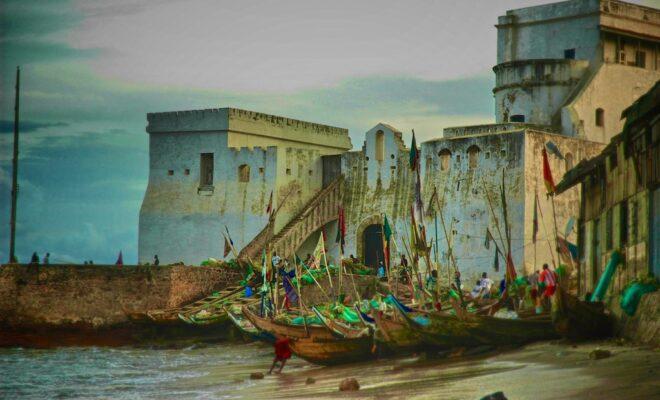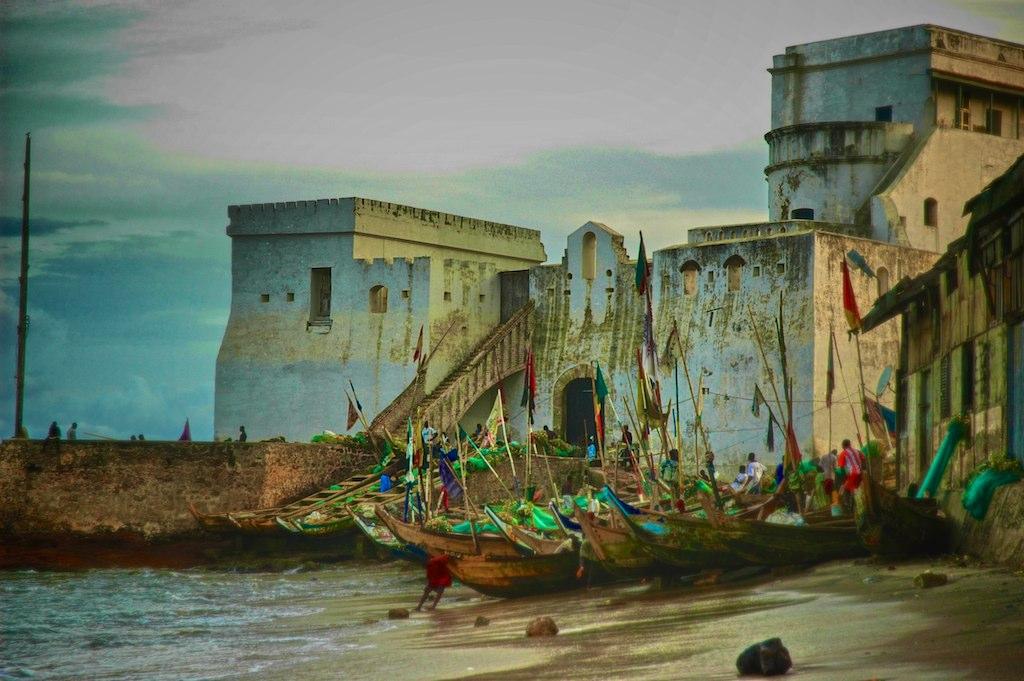We need to talk about Ghana’s Year of Return and its politics of exclusion

The campaign had the opportunity to welcome all people of African descent and fully engage with their history of slavery. It did not.

British slave processing fort, Cape Coast Castle’s infamous “Door of No Return” is where 200 years ago thousands of African slaves sent to colonies in North America under brutal conditions . Credit: Anthony Maw.
In September 2018, Ghana’s President Nana Akufo-Addo declared 2019 as the Year of Return in order to commemorate the 400th anniversary of the arrival of African slaves in America. He called on people of African descent (read African-Americans) to return to their home continent (read Ghana) in a “major landmark spiritual and birth-right journey”. The campaign positions Ghana as a “key travel destination for African Americans and the African diaspora.”
The year-long campaign comes to a heady climax this December with a full calendar of events planned including concerts, African-American celebrity sightings (Beyoncé’s rumoured to be en route!), art exhibits, visits to heritage sites, fashion shows, movie premieres, and creative economy and trade conferences.
Akufo-Addo’s call has been a great success thus far. According to figures released by the Ghana Immigration Service, Americans arriving in Ghana increased by 26% to their highest ever rate between January and September 2019. The numbers of visitors from the UK (24%), Germany (22%), South Africa (10%) and Liberia (14%) also grew. All told, Ghana reportedly issued 800,000 visas this year and this week announced that all nationalities will be eligible to receive a visa on arrival for the next month or so due to the heavy demand.
While the Year of Return has been laudable in many ways, however, its exclusive focus on the transatlantic slave trade, with the US at the centre, has erased other crucially important aspects and legacies of Ghana’s history of slavery.
This history is much more layered than the campaign will have us believe. Missing, for instance, is any mention of the trans-Saharan slave trade in which an estimated 6-7 million people, including from the Sokoto Caliphate and Borno, were forcibly transported to North Africa, Europe and the Middle East. This took place between the rise of Islam and the 20th century, a period ranging over 1,250 years. The legacy of this trade is still palpable in Mauritania where slavery is still a present-day reality. The country only formally abolished slavery in 1981 and local activists estimate that 20% of the population, all black, are still enslaved.
Where are the calls for these descendants to return? Where are the African descendants outside of the US, the Jamaicans, Cubans and Brazilians?
By excluding these other narratives, important stories of resistance are also missed. The stories of Cudjoe and other members of the Accompong band, of the Haitian revolution, or of Nanny in Jamaica, who is believed to have been captured from the Asante ethnic group and was one of the Maroons, a group of enslaved black people who escaped enslavement and established their own communities. For close to 30 years, the group fought the British and freed others. Communities like Nannyville Gardens in Kingston, Jamaica, stand in her memory. Her portrait is on the 500 Jamaican dollar bill.
Alongside not telling the full (hi)story of slavery, the Year of Return campaign also does not honour the memory of how systems of slavery were administered when it thrived. Despite the fact that much of the enslavement took place in what is now northern Ghana, commemoration activities have been confined to the south and particularly the capital, Accra.
The north has much to remember, especially among the Builsas and Kassena-Nankanas. These ethnicities suffered a triple assault. Firstly, the Mossi and Arab enslavement traders raided their villages in the trans-Saharan enslavement trade. Then came the transatlantic enslavement. And then, in colonial times, they were conscripted into the World Wars, but because the area lacked natural resources, the colonial administration barely extended infrastructure and education to them.
If the Year of Return’s intention was to commemorate those affected by slavery, it would have included an extensive focus on the north. It could have provided an opportunity for restitution. On the land of the Kassena-Nankanas sits the Pikworo Slave camp at Paga-Nania, one of the permanent reminders of the enslavement trade. This site has been described as the “the site of the genesis of slave trade in the Gold Coast”. From there, the enslaved people were sold to the French, the Dutch and the English. Some were then transported to the Salaga market. Others were sent further south to the Atlantic Ocean. Yet the site is missing from the year’s events. .
The Year of Return is a noble idea but its failure to fully engage with the history of slavery and its focus on just a select portion of African descendants compromises its credibility. One could speculate that this is because the campaign is predominantly private sector-led and that its foremost purpose is profit. The list of commemorative activities is largely made up of parties with high-priced tickets. Flights prices to Ghana have quadrupled in some cases, hotels have hiked up prices, and many private citizens are renting out their spare rooms.
This may have contributed to the fact that while the campaign claims to be of historical and cultural significance, it has created few avenues to reflect on its past. There is much to be reflected on. The residue of enslavement is pervasive in language and architecture across Ghana. In Accra, there is a suburb called Achimota which translates “Do not mention the name” in Ga. Among the Akans, it is customary to ask a visitor if she is to be hidden. In Ga architecture, long alleys, which were used to wade off raiders, still exist to this day. In northern Ghana, the memory of enslavement resides in songs.
The Year of Return campaign had the opportunity, and a whole year, to critically engage with the history of Africans and people of African descent in its entirety. On this, it fell well short.







Obviously, you have not been following what is going on. The president traveled around the world(except South America) to invite people of African ancestry in the Caribbean which let to the PM of Barbados visiting Ghana. Yes the Caribbean Islands are very much involved to the extend that Ghana will have its first Crib/Ghana carnival this month in Kumasi.
You clearly live under a rock. An extensive tour of the Caribbean was done that was well publicized culminating with an official state visit by the Prime Minister of Barbados with a large business delegation. She visited the North and attended one of the traditional ceremonies. Be better informed next time.
Rosita and Myles don’t seem to have read the article properly, and are unnecessarily impolite. The writer never denied these Caribbean dimensions, but laments the absence of outreach to the trans-Saharan diaspora, such as the Gnawas musicians now famous for their Moroccan music but whose name and origins lay in the ancient empire of Ghâna, after which our modern Ghana is named.
The author probably wants us to also discuss the slavery of northern Egypt and the Jews, because guess what Egypt is in Africa, then we can consider the slavery of the Ghana empire, Mali Empire etc, when Sumanguru and Sundiata were trading in Slaves from Northern Africa and sending blacks into Europe as slaves. Some of which served in the Roman armies and in the Greek armies of old. We probably can consider the Home coming of the ancestors of Hercules and Achilles. You know, forget all this trope, let us go back to the basics and consider the first human specie that migrated unwillingly out of Africa and organize a homecoming for all of their ancestors, how about that? Rolled eyes…. dipshit.
Thank you for writing this. More Africans were sent to South America, so why didn’t the President include them? There are more considerably more Black Brazilians than Black Americans, for instance, around 15-million more. Also, Ghana is so discriminatory toward Black foreigners, especially Black people with dreadlocks, that Ghana probably wanted to keep the ugly truth hidden as long as possible, all while taking as much money as it could from Americans frustrated with Trump and Brits frustrated with Brexit. Ghana loves white Americans and extend them every courtesy. Black Americans are treated like we willingly left Ghana, never struggled in America, and should be grateful to the descendants of the people that helped send our ancestors off to slavery, except of course, when they want your money. Finally, given all the attention hoisted on celebrities while the visit of Presidents of the American Historically Black Colleges and Universities was largely ignored, Ghana showed itself as a shallow nation, imo. Small wonder Ghana ranked dead last in the international educational rankings.
I think this is a great article. Many think of the transatlantic slave trade only but transaharran trade lasted longer and had larger numbers. Castration of male slaves ensured that there are very few blacks in the Arab world. I like very much about the fact that not much attention is given to the north when we know most of the slaves came from the north. They were dirty and had to be washed in Assin Manso and of course the castles on the coast were just kraals. If i buy a cow from a kraal in Ashiamandoesnt mean the cow was bred in Ashaiman.The talk about Jamaica amazes me. How come the national tree of Jamaica is the ackee apple and does it occur to people that the only place the ackee apple grows naturally is north western Ghana? Let’s think about it
Hater! You think any other race of people would
Un-Celebrate their visitors? Can’t we just be tourists who want to touch African soil at least once in our lifetime? Spend tourism dollars there instead of Europe? Asia? I’ve been to West Africa 3 times—all it owes me is a great vacation—the rest I was able to grasp on my own.
Millions upon millions of Africans were taken away from the gold coast and now less than 200 are allowed to be citizens in Ghana. What is that to celebrate considering the numbers. Whoopty do!!!
First of all, this is about the TRANSATLANTIC SLAVE TRADE NOT ANY OTHER SLAVE TRADE. SECONDLY, THIS IS ABOUT MONEY, SO THAT’S WHY IT WAS GEARED TOWARDS AFRICAN AMERICANS.
Look, I’m sure it will improve as it ages. The goal is to improve us spiritually & connect economically with people who look like us & who care about us. This is only the beginning. I saw they’ve generated nearly $2billion this year of return. Black peoples power base should be Africa. Just like how the Chinese have China. The diaspora must also invest here. It’s the richest continent on earth.
Hello,
My name is Lisa Aubrey. I am a faculty member at Arizona State University, and a former Fulbright faculty member at University of Ghana, Legon. My most recent book is on Cameroon and transatlantic slavery, in which I make some comparisons to Ghana.
I would like to be in touch with Journalist Kwabena Agyare Yeboah, whose writings I always look forward to reading. His piece of December 19, 2019 on the Year of Return in and Politics of Exclusion is interesting, intriguing, and troubling.
It appears to me that Journalist Kwabena Agyare Yeboah missed a major conference which I organized and that was held in Ghana at GIMPA and in community embedded sessions. The dates were during the period of August 2-11, 2019. At the conference, we engaged the very issues that Yeboah raises, and more. I wish he would have been at the conference. If fact, I queried why journalists were not present. Please see the conference program booklet covered attached.
Our next trip and conference, in line with Ghana’s lead with the Year of Return, will be in Cameroon in December 2020 under the theme Roots, Remembrance, and Reconnections.
I look forward to your response, and hope to discuss and meet Journalist Kwabena Agyare Yeboah,
Medase,
Lisa Aubrey https://squareup.com/store/roots-and-reconnection/item/in-search-of-bimbia
I think, his analysis is coming late. He had the whole to make these siggestions and waited til the end of the event to speak up. Nothing stopped him from contributing these ideas!
Interesting, not sure I agree with all points given that as an A-A with Caribbean roots who have lived and worked extensively in Northern Ghana I understand the focus on those of us who were forced to cross the ocean with most not making it. Your contempt for A-A is sad..and I am left to wonder your broadening of the return is to exclude those of us who are Black from the West….we are still not sure why that sentiment exists among some….. I often tell my country wo/man to go to the North of Ghana and anyone I bring – we go….I do feel more at home there….and so if your request is for the effort to return to be more inclusive than that should be the ask… .unlike many of our Caribbean / Latinx brethren – A-A are the ones in which all cultural legacy has been erased and in which the attempts have been made to make sure we don’t recall. But we know that many of our cultural traits as A-A comes from us being African in origin. Our Caribbean/Latinx folks have a little advantage in knowing oneself because many Caribbean islands can trace general lineage to countries and to people…most A-A can not….also our Caribbean and A-A have begun seeing the other as one people – and many of us like myself are multi-ethnic…….I advise you to do much more research to understand the significance of the Atlantic slave trade….those 400 years+ put in motion the wealth of the west that dominates Ghana and most of Africa today
Why would Ghana have to mention slavery in every other place than itself? That would be something that governments in say Tanzania would invite us to. I think Ghana did an amazing job in most aspects. The only issue I agree with the writer on is the jacking up of lodging and flights, and that we the African descendants of slaves have to pay to see what happened to us at Elmina Castle for example, and be ridiculously harassed by vendors as you enter and exit. THAT was very stressful and triggered me because there’s an overwhelming feeling that comes over you when you arrive, and you really want to focus and take it all in. The prices really made me feel they were soo determined to sell our ancestry out of greed, only to overcharge their descendants because of greed. Feels a little predatory when you think about it.
Seems like a rant to me. People from all over the world are coming to Ghana, to learn, explore the culture, travel the country and yes….party (that’s okay too). Celebrate the joy in that. They asked us to return so we did. We brought our curiosity, our love for the Continent, our joy in wanting to be around people who look like us and our US Dollars to pour into Ghana’s growing economy. What will it take to make people like this author happy?
Ghana today is not the Ghana of ancient and has no relationship to trans Saharan trade. Ghana merely took the name and is not even in the same geographic space and are separated by centuries. It also has no relationship to sokoto or borno, which are in nigeria. Besides the sokoto caliphate came about in early 1800s when the transatlantic slave trade was over and had no culpability there. And as others have pointed out the president made overtures to the broader diaspora not just America. however perhaps coverage focused mostly on America giving it that impression
Although the article is well intentioned it feeds into our “pull him down” syndrome which sadly negates the achievements Ghana/Ghanaians make. Instead of criticizing a very successful initiative why not propose an extension of the movement to cover the areas of the slave trade which should also be covered.
I believe that “The Year of Return” has been a phenomenal success and with this elevated platform we can lift up the less well known history of slavery to eyes that are open and ears that are willing to hear.
Thank you for letting us know.
“Year of Return” a scam that more African countries wish that they had been in on. In all of these centuries, Why did Africans never fight for the return of the Africans it lost and/or shamelessly sold away? Now that their own economy is in shambles, African Americans are the supposed come up? Africans made money on our enslaved ancestors’ way out and wish to make more on the descendants of the enslaved on the way back in, to visit with a high ticket price. It should have been free. Ghana has a long held history of exploiting and scamming its fellow Blacks to this day and even beyond slavery with these Cafe Boys (online love scams), the Trokoshi (girl enslavement) and Kayayo (child labor) systems. The African Americans who participate in these visits deserve far more than parties and Slave Castle trips but sadly, they are seen as cash cows by Africans. Some have been offered land deals but those who can afford to leave America are often well-to-do Blacks who boost Ghana’s economy. Ghanaians who come to live in America do a lot of Love Scams on both Black and White women (they call themselves businessmen) but have women and children already at home in Ghana that they will never mention. A Ghanaian taxi driver warned me that I’d be stuck there if I tried to live there and he fought to get out, even to drive a cab. I worked with a Ghanaian woman who was raised here. Her parents sent money “home” to Ghana to have their retirement home built only to learn that her Ghanaian Godparents had stolen every dime and never built the home. The Godparents casually told the parents, “We needed it.” The parents’ entire life savings was stolen by their best friends. I personally was involved with a Ghanaian man who scammed me. His Ghanaian friends who lived here were all living with White women. All of them had women and children at home and this man never told me a thing. I also worked with a Ghanaian man and became friends with him, his wife and child, only to have the friendship end because I wouldn’t enter into a paper marriage scam with him to secure their citizenship. African Americans, please understand that Ghanaians speak badly about you as soon as you turn your backs. You are an “Obrune” (White Person) in their eyes. Yes, celebrities and “web influencers” will brag of the wonderful time they had at the fine hotels but their image and popularity protects them from the behaviors the everyday Black will encounter. Your land buying and neighborhood and acceptance will be different in the long term. Slavery has displaced African Americans to the point where your home is neither here (where we live in a polixe state) nor there (where you’ll surely get used). You have a birthplace and travel destinations but no true home in this world, thanks to the greed of people. Should you visit Africa someday? Yes. Are White people the answer? No. Go see the entire world, if you wish. Just understand that African Americans get used in every corner of the world but your true brothers and sisters were the ones you were raised with.
Jane, I hate what you wrote but a lot of what you said was 100% spot on correct.
Thank you for bringing this to the forefront. I am an American of Caribbean descent living in Ghana and have been disappointed in the lack of inclusivity in the Year of Return. There really has been none to very little South or Central American representation either in participants or in the official or side-line events. While the campaign did a lot better with reaching out to the Caribbean, I believe more could be done there as well.
For those who are criticizing the author for bringing up this issue, how much do you REALLY know or understand about Latin America and the struggles people of Afro-decent face their country or region? This is part of the problem, too many of us have not been educated on the history and culture and life of Afro people across the diaspora. We tend to only focus on our own stories.
Given the lack of representation, why wouldn’t we do more to include Latinx people? Don’t you think that they could also benefit from visiting places like Cape Coast Castle and reconnecting with their roots?
Now I know what one Ghanaian guy meant when he called me a slave daughter, he tried to insult me with the disgusting history that he seemed to be so proud of. I think Ghana should publicly apologise for opening the floodgate of horror on us. I won’t ever go to Ghana because I have not heard an apology yet. GHANA should pay proper reparations for what it did. I am Jamaican.
Atleast,Ghana’s president visited the caribbean and the US to call upon the year of return,so it enough to tell other African diaspora anywhere around the world to come visit Ghana to understand the history of the slave trade and visit the castles and embrace African culture.so what is the problem if he did not visit South america atleast his visit to these two places about the year of return it should encourage African diaspora in any other continent to visit Ghana,does it mean he should roam around this planet,so bcos he did not call upon them its enough reason to not participate,how can u say that.
We need to talk about Ghana’s Year of Return and its politics of exclusion | African Arguments
trxzfjvxs http://www.gwhiwk8d9x9859w0x68512al26ck5z4gs.org/
[url=http://www.gwhiwk8d9x9859w0x68512al26ck5z4gs.org/]utrxzfjvxs[/url]
atrxzfjvxs
is chloroquine safe https://chloroquineorigin.com/# what are the side effects of hydroxychloroquine
https://cialiswithdapoxetine.com/ cialis alternative
cialis pills cialis pills
cheap cialis generic cialis